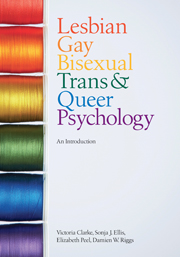Book contents
- Frontmatter
- Contents
- List of boxes
- Introduction: how to read and use this book
- Section I History, contexts and debates in LGBTQ psychology
- Section II Understanding social marginalisation in LGBTQ lives
- Section III LGBTQ experiences across the lifespan
- Conclusion
- Glossary
- Additional resources
- References
- Index
Additional resources
- Frontmatter
- Contents
- List of boxes
- Introduction: how to read and use this book
- Section I History, contexts and debates in LGBTQ psychology
- Section II Understanding social marginalisation in LGBTQ lives
- Section III LGBTQ experiences across the lifespan
- Conclusion
- Glossary
- Additional resources
- References
- Index
Summary
We have listed a range of documentaries and feature films (that are widely accessible), as well as some web resources, that we have found useful in teaching and learning about LGBTQ (and intersex) issues.
Documentaries and feature films
History of LGBTQ psychology
Kinsey (Bill Condon Dir., 2004). The story of the life and work of Alfred Kinsey, the ‘founding father’ of modern sexology. The film provides an insight into Kinsey's research and methods, especially the less widely publicised aspects of his work.
History and politics of LGBTQ communities
Go fish (Rose Troche Dir., 1994). Probably one of the most well known lesbian films, centred on a burgeoning relationship between two lesbian women; the film shows a variety of lesbian lives and explores a number of issues that were ‘live’ in lesbian communities in the 1990s such as lesbian sex, lesbian stereotypes (within lesbian communities), butch/femme, lesbians having sex with men and coming out to family.
If these walls could talk 2 (Jane Anderson and Martha Coolidge Dirs., 2000). A collection of three short films, each depicting a different era in lesbian communities and politics, framed around the same house. The first film is set in the early 1960s and tells the story of an older lesbian (Edith) whose partner dies. Edith has to mourn her loss in a context of homophobia and a lack of same-sex partnership recognition.
- Type
- Chapter
- Information
- Lesbian, Gay, Bisexual, Trans and Queer PsychologyAn Introduction, pp. 272 - 277Publisher: Cambridge University PressPrint publication year: 2010



